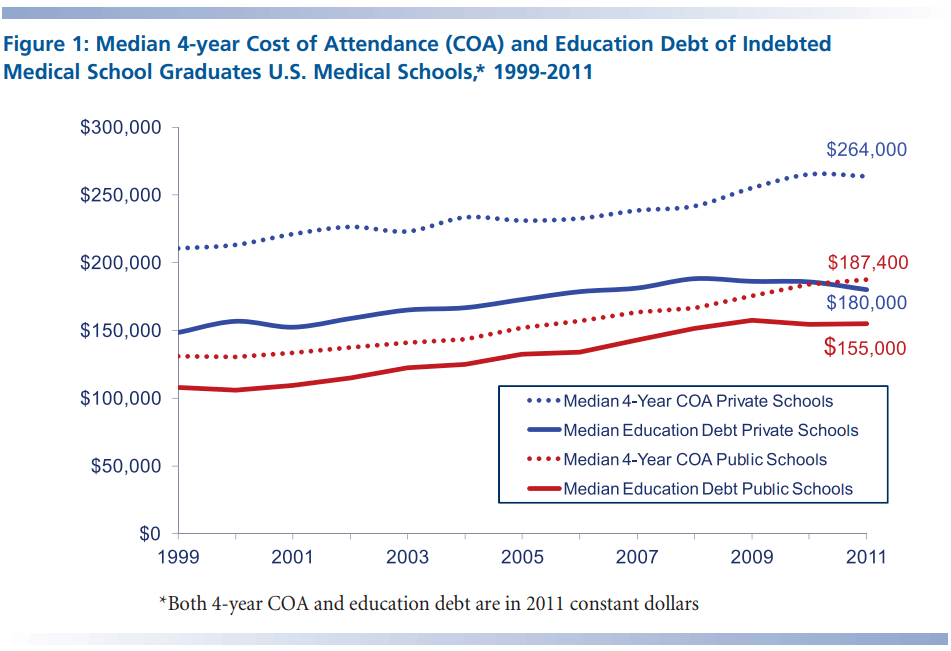 Many of our country’s most ambitious students pursue careers in the medical field. They may be dedicated to helping people or infatuated with scientific research. Many students seek the financial stability a medical career can offer. No matter what the driving factor behind your decision to attend medical school, there’s one thing you’re going to have to tackle, first: the cost. If you’re considering a medical academic career, first consider the average cost of medical school to make sure you’re ready to take on the burden.
Many of our country’s most ambitious students pursue careers in the medical field. They may be dedicated to helping people or infatuated with scientific research. Many students seek the financial stability a medical career can offer. No matter what the driving factor behind your decision to attend medical school, there’s one thing you’re going to have to tackle, first: the cost. If you’re considering a medical academic career, first consider the average cost of medical school to make sure you’re ready to take on the burden.
Average Cost of Medical School in 2018
In 2017, the average cost of medical school was $32,495 for a single year of study at public medical colleges and $52,515 for a single year at a private medical college.
The average cost of medical school, like the average cost of college in general, has continuously increased over the years. Since the cost of medical school tuition has been rising reliably over the past two decades, you can expect the average cost of medical school tuition in 2018-19 to be around the same, if not higher than the last school year.
Average Cost of Medical School Through the Years
According to these numbers from American Medical Student Association (AMSA), medical school since the 1980s has seen a particularly dramatic hike in cost:

Source: aamc.org
These skyrocketing averages represent only tuition costs and do not factor in other college expenses like room and board, transportation, or books.
Average Cost of Pre-Med School
While medical school itself will likely be the costliest part of earning your degree in medicine, pre-med can’t be omitted from your budget. Before you can even consider applying to your dream med school, you’ll need to obtain an undergraduate degree.
According to CollegeCalc, the average pre-med program in the 2016-17 school year cost about $41,770 (out of state) per year. Add four years of undergraduate school to four years of med school, and you come to a total of over $300,000 to earn your medical degree at a public college, out-of-state, on average. This is a very large number, but not completely dissimilar to the cost of a masters degree.
Financial Aid for Medical School
Luckily, you’re not faced with the challenge of paying for medical school entirely on your own. If you don’t mind taking on a good amount of debt, financial aid loans from the federal government, as well as loans from private institutions can help get you through your years of school. Just make sure you’re not taking on more debt than you need, and that you know how you’re going to pay off that debt when the time comes.
FAFSA
If you’re applying for medical school, you’re probably already familiar with the FAFSA (free application for federal student aid). Like with undergraduate school, the first step to receiving financial aid for med school is completing these forms. Be sure to contact the financial aid office at the school to which you’re applying to verify their requirements, and don’t miss the deadline for applying for your FAFSA.
Association of American Medical Colleges (AAMC)
The Association of American Medical Colleges is one of your most important resources when it comes to applying to medical school—from making the decision to apply and finding the right school, to applying for financial aid. The AAMC will even help you all the way through med school and into your career, with essential information on managing your finances during medical school and finding your community.
Medical School Scholarships
The best way to make sure you’re prepared to pay for medical school is by being proactive. As soon as you know which school you want to attend, and you’re ready to apply for financial aid, it’s time to seek out additional sources of aid, such as scholarships. Your college financial aid office, as well as the AAMC Scholarship Supplement, can help you discover scholarships you might not know about.
Choosing the Right Med School
Most medical school applicants have one thing in mind when they’re first searching for the best medical school: reputation. You want to find the most prestigious school with the most well-respected name in the medical field. But a good reputation doesn’t always equal a good education or experience.
The Princeton Review recommends asking yourself a set of questions to help evaluate which schools are and are not the right match for you. This includes determining the academic focus of the school and ensuring that the school you’re applying to has a strong focus and dedication to the field of study you’re interested in. For example, if you’re most interested in research and lab work, you’ll want to avoid med schools that focus exclusively or nearly exclusively on patient care.
Another question you’ll want to ask yourself is about the culture of the campus. How rigorous are the academics? Can you see yourself living there? Make sure you know all the ins and outs of the school—and not just its name–before committing.
Is Medical School Worth It?
When you’re considering med school, the biggest hurdle you might (rightly) anticipate is that of paying for school. However, yet another consideration must be taken before you take the leap into a medical degree program: the investment of time. It takes about 10 years (including pre-med, med-school, and residency), on average, to earn a degree and begin practicing medicine full-time at full salary. Even then, many doctors find themselves working double-time just to repay their debts and keep up with investments.
If you’re considering medical school, take into account the average cost of medical school dollar-wise, but don’t forget to also tally up the time you’ll spend earning your degree and repaying that investment.
What’s Right for You
Ultimately, the decision about whether or not to go to medical school depends on your goals and disposition as a person. Medical school, along with law school, is one of the single most expensive things you can choose to study, and that investment doesn’t always pay off entirely—financially, at least. The best thing you can do before taking out any loans or paying any tuition is to make sure medical school is right for you, as a person and as a student.

